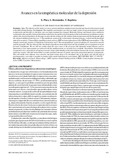Mostrar el registro sencillo del ítem
Avances en la terapéutica molecular de la depresión
| dc.rights.license | http://creativecommons.org/licenses/by-nc-sa/3.0/ve/ | |
| dc.contributor.author | Páez, Ximena | |
| dc.contributor.author | Hernández R., Luis F. | |
| dc.contributor.author | Baptista Troconis, Trino José | |
| dc.date.accessioned | 2015-02-05T15:57:10Z | |
| dc.date.available | 2015-02-05T15:57:10Z | |
| dc.date.issued | 2003 | |
| dc.identifier.uri | http://www.saber.ula.ve/handle/123456789/39731 | |
| dc.description | Artículo publicado en la: Revista de Neurología, 2003; 37 (5): 459-470 | es_VE |
| dc.description.abstract | Objetivo. Revisar la terapéutica farmacológica antidepresiva presente y futura basada en los avances de la biotecnología. Desarrollo. La visión simplista y errónea de un único sistema neurotransmisor alterado en la depresión y, por tanto, un único tratamiento, ha cambiado. Las técnicas de la biología molecular y la genética han permitido conocer otras posibles alteraciones químicas en el cerebro, más allá de la única participación de los sistemas moduladores monoaminérgicos, la hipótesis clásica. Se describen las evidencias acerca de las relaciones entre la depresión y el efecto terapéutico de los antidepresivos clásicos con: a) El sistema peptidérgico de la hormona liberadora de la corticotropina, el cortisol y el estado funcional de sus receptores; b) Los sistemas de señalización intracelular como el AMPc sobre factores de transcripción como CREB y las neurotrofinas; c) El sistema inmune y las citocinas; d) La transmisión glutamatérgica, y e) El sistema neuropeptidérgico de la sustancia P, los esteroides neuroactivos y la glía. Esto ha permitido la emergencia de otras hipótesis bioquímicas sobre la depresión y la posibilidad de nuevos tratamientos. Conclusiones. Aunque hoy se sigue sin conocer con certeza la causa exacta ni los procesos que determinan las enfermedades mentales como la depresión, ni cómo se produce la mejoría con los antidepresivos disponibles, hay una gran esperanza de que, con la ayuda de la biotecnología, se avanzará hacia un mejor conocimiento de las interrelaciones entre los sistemas nervioso, inmune y endocrino, con sus cascadas intracelulares y sus consecuencias finales en la expresión genética y la función proteica en la depresión; ello permitirá desarrollar fármacos más efectivos, rápidos y selectivos que, en el futuro, con la ayuda de la psicogenómica, podrán incluso diseñarse para cada paciente. [REV NEUROL 2003; 37: 459-70] | es_VE |
| dc.language.iso | es | es_VE |
| dc.rights | info:eu-repo/semantics/openAccess | |
| dc.subject | Biotecnología | es_VE |
| dc.subject | Citocinas | es_VE |
| dc.subject | Hormona liberadora de corticotropina (CRH) | es_VE |
| dc.subject | Monoaminas | es_VE |
| dc.subject | Proteína que se enlaza al elemento de respuesta al AMPc (CREB) | es_VE |
| dc.subject | Psicosis afectivas | es_VE |
| dc.title | Avances en la terapéutica molecular de la depresión | es_VE |
| dc.type | info:eu-repo/semantics/article | |
| dc.description.abstract1 | Aims. The objective of this study is to survey present and future antidepressant drug therapy based on the progress made in the field of biotechnology. Development. The simplistic and mistaken view that one single system of neurotransmission is altered in depression and that there is, therefore, just one single treatment has changed. Molecular biology and Genetics have enabled us to determine other possible chemical alterations in the brain, beyond the sole participation of the monoaminergic modulation systems, which is the classical hypothesis. In this paper we describe the evidence for the relations between depression and the therapeutic effect the classical antidepressants have on: 1. The peptidergic system of the corticotropin-releasing hormone, cortisol and the functional state of its receptors; 2. Intracellular signalling systems such as cAMP on transcription factors like CREB and neurotrophins; 3. The immune system and cytosines; 4. Glutamate transmission; and 5. The neuropeptidergic system of substance P, neuroactive steroids and the neuroglia. This has allowed other biochemical hypotheses about depression and the possibility of new treatments to be put forward. Conclusions. We are still not certain about the exact cause or the processes that determine mental illnesses such as depression or how improvements are achieved with the antidepressants we currently have available. Nevertheless, biotechnology is expected to be a great help in advancing towards a better understanding of the interrelations between the nervous, immune and endocrine systems, with their intracellular cascades and final outcomes in genetic expression and protein function, in depression. This will enable more efficient, more selective and faster-acting drugs to be developed and, in the future and with the help of psychogenomics, even make it possible to produce tailor-made medication for each patient. [REV NEUROL 2003; 37: 459-70] | es_VE |
| dc.description.colacion | 459-470 | es_VE |
| dc.description.email | pacap@ula.ve | es_VE |
| dc.description.email | hernande@ula.ve | es_VE |
| dc.description.email | trinob@ula.ve | es_VE |
| dc.publisher.pais | Venezuela | es_VE |
| dc.subject.facultad | Facultad de Medicina | es_VE |
| dc.subject.keywords | Affective psychosis | es_VE |
| dc.subject.keywords | Biotecnology | es_VE |
| dc.subject.keywords | cAMP response element binding protein (CREB) | es_VE |
| dc.subject.keywords | Corticotrophin-releasing hormone (CRH) | es_VE |
| dc.subject.keywords | Cytosines | es_VE |
| dc.subject.keywords | Monoamines | es_VE |
| dc.subject.thematiccategory | Medicina y Salud | es_VE |
| dc.subject.tipo | Artículos | es_VE |
| dc.subject.unidadinv | Laboratorio de Fisiología de la Conducta | es_VE |
| dc.type.media | Texto | es_VE |


